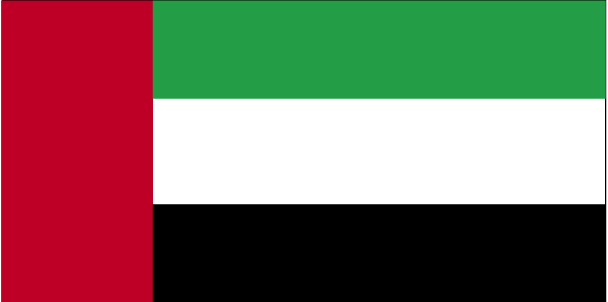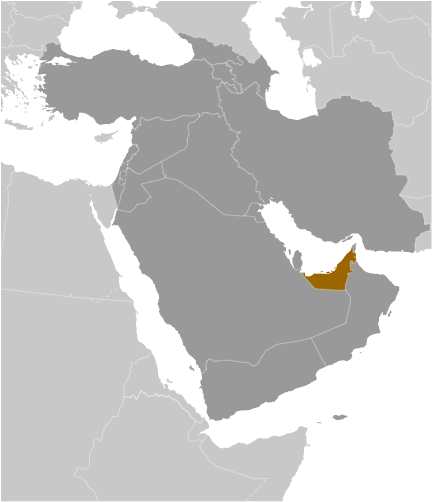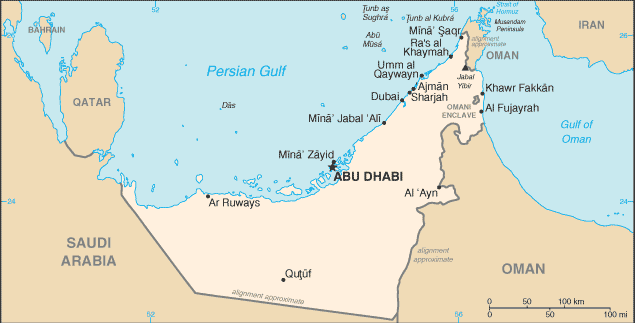The Trucial States of the Persian Gulf coast granted the UK control of their defense and foreign affairs in 19th century treaties. In 1971, six of these states - Abu Zaby, 'Ajman, Al Fujayrah, Ash Shariqah, Dubayy, and Umm al Qaywayn - merged to form the United Arab Emirates (UAE). They were joined in 1972 by Ra's al Khaymah. The UAE's per capita GDP is on par with those of leading West European nations. Its generosity with oil revenues and its moderate foreign policy stance have allowed the UAE to play a vital role in the affairs of the region. For more than three decades, oil and global finance drove the UAE's economy, however, in 2008-09, the confluence of falling oil prices, collapsing real estate prices, and the international banking crisis hit the UAE especially hard.
Population
4,975,593
Country comparison to the world:114
note:estimate is based on the results of the 2005 census that included a significantly higher estimate of net immigration of non-citizens than previous estimates (July 2010 est.)
Nationality
Noun:Emirati(s)
Adjective:Emirati
Ethnic groups
Emirati 19%, other Arab and Iranian 23%, South Asian 50%, other expatriates (includes Westerners and East Asians) 8% (1982)
note: less than 20% are UAE citizens (1982)
Religions
Muslim 96% (Shia 16%), other (includes Christian, Hindu) 4%
Languages
Arabic (official), Persian, English, Hindi, Urdu
Country Name
Conventional long form:United Arab Emirates
Conventional short form:none
Local long form:Al Imarat al Arabiyah al Muttahidah
Local short form:none
Former:Trucial Oman, Trucial States
abbreviation: UAE
Government Type
federation with specified powers delegated to the UAE federal government and other powers reserved to member emirates
Capital
Name:Abu Dhabi
Geographic coordinates:24 28 N, 54 22 E
Time difference:UTC+4 (9 hours ahead of Washington, DC during Standard Time)
Administrative divisions
7 emirates (imarat, singular - imarah); Abu Zaby (Abu Dhabi), 'Ajman, Al Fujayrah, Ash Shariqah (Sharjah), Dubayy (Dubai), Ra's al Khaymah, Umm al Qaywayn (Quwayn)
Independence
2 December 1971 (from the UK)
National Holiday
Independence Day, 2 December (1971)
Constitution
2 December 1971; made permanent in 1996
Legal system
based on a dual system of sharia and civil courts; has not accepted compulsory ICJ jurisdiction
Suffrage
none
Executive branch
Chief of state:President KHALIFA bin Zayid al-Nuhayyan (since 3 November 2004), ruler of Abu Zaby (Abu Dhabi) (since 4 November 2004); Vice President and Prime Minister MUHAMMAD BIN RASHID al-Maktum (since 5 January 2006)
Head of government:Prime Minister and Vice President MUHAMMAD bin Rashid al-Maktum (since 5 January 2006); Deputy Prime Ministers SAIF bin Zayid al-Nuhayyan (since 11 May 2009) and MANSUR bin Zayid al-Nuhayyan (since 11 May 2009)
Cabinet:Council of Ministers appointed by the president
(For more information visit the World Leaders website)
note: there is also a Federal Supreme Council (FSC) composed of the seven emirate rulers; the FSC is the highest constitutional authority in the UAE; establishes general policies and sanctions federal legislation; meets four times a year; Abu Zaby (Abu Dhabi) and Dubayy (Dubai) rulers have effective veto power
Elections:president and vice president elected by the FSC for five-year terms (no term limits) from among the seven FSC members; election last held 3 November 2009 upon the death of the UAE's Founding Father and first President ZAYID bin Sultan al Nuhayyan (next election NA); prime minister and deputy prime minister appointed by the president
Election results:KHALIFA bin Zayid al-Nuhayyan elected president by a unanimous vote of the FSC; MUHAMMAD bin Rashid al-Maktum unanimously affirmed vice president after the 2006 death of his brother Sheikh Maktum bin Rashid al-Maktum
Legislative branch
unicameral Federal National Council (FNC) or Majlis al-Ittihad al-Watani (40 seats; 20 members appointed by the rulers of the constituent states, 20 members elected to serve two-year terms)
Elections:elections for one half of the FNC (the other half remains appointed) held on 18-20 December 2006; the new electoral college - a body of 6,689 Emiratis (including 1,189 women) appointed by the rulers of the seven emirates - were the only eligible voters and candidates; 456 candidates including 65 women ran for 20 contested FNC seats; one female from the Emirate of Abu Dhabi won a seat and 8 women were among the 20 appointed members
note: the FNC reviews legislation but cannot change or veto
Judicial branch
Union Supreme Court (judges are appointed by the president)
Political Parties and Leaders
none; political parties are not allowed
Political pressure groups and leaders
NA
International organization participation
ABEDA, AFESD, AMF, CAEU, CICA, FAO, G-77, GCC, IAEA, IBRD, ICAO, ICC, ICCt (signatory), ICRM, IDA, IDB, IFAD, IFC, IFRCS, IHO, ILO, IMF, IMO, IMSO, Interpol, IOC, IPU, ISO, ITSO, ITU, LAS, MIGA, NAM, OAPEC, OIC, OPCW, OPEC, PCA, UN, UNCTAD, UNESCO, UNIDO, UPU, WCO, WFTU, WHO, WIPO, WMO, WTO
Diplomatic representation in the US
Chief of mission:Ambassador Yousef bin Mani Saeed al-OTAIBA
Chancery:3522 International Court NW, Suite 400, Washington, DC 20008
Telephone:[1] (202) 243-2400
FAX:[1] (202) 243-2432
Diplomatic representation from the US
Chief of mission:Ambassador Richard G. OLSON, Jr.
Embassy:Embassies District, Plot 38 Sector W59-02, Street No. 4, Abu Dhabi
Mailing address:P. O. Box 4009, Abu Dhabi
Telephone:[971] (2) 414-2200
FAX:[971] (2) 414-2603
consulate(s) general: Dubai
Flag description
three equal horizontal bands of green (top), white, and black with a wider vertical red band on the hoist side; the flag incorporates all four Pan-Arab colors, which in this case represent fertility (green), neutrality (white), petroleum resources (black), and unity (red); red was the traditional color incorporated into all flags of the emirates before their unification










